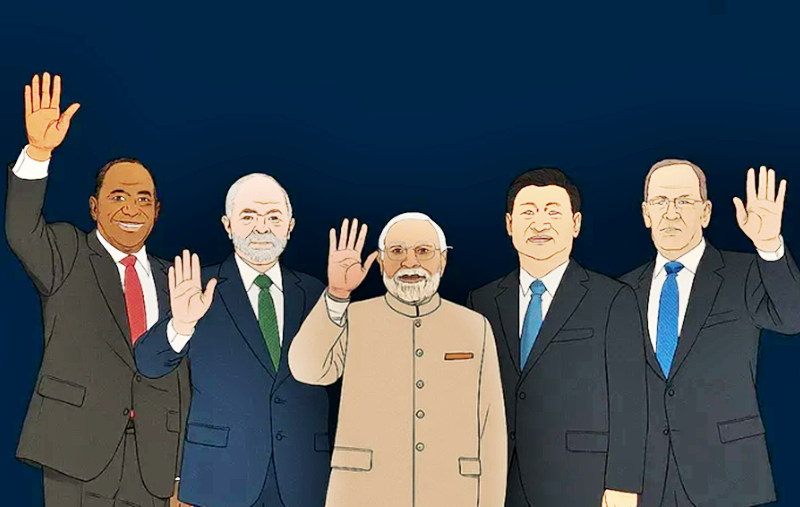BRICS is strengthening in scope and influence.A new economic cooperation scheme is emerging.

By dermot*no - Farhad Ibragimov - July 16, 2025
What just happened in Rio should scare the West. It was a coordinated rejection of Western power – and a declaration of intent.
A few days ago, Rio de Janeiro hosted the 17th BRICS Summit, a significant step forward for the organization at a time of accelerating changes in the global political and economic landscape. Represented by Foreign Minister Sergei Lavrov, Russia played an active role during the summit, while President Vladimir Putin addressed the plenary via video link.
In his speech, the Russian leader provided a comprehensive analysis of global trends and emphasized that the liberal model of globalization is losing its viability, as the center of economic and political activity is clearly shifting towards the global South – developing countries with growing demographic, resource and technological potential.
The Rio Summit confirmed the growing political weight of BRICS and its ambition to become a key player in shaping a new multipolar world order. The high-level meetings attracted global attention not only for their scope but also for their concrete results. A total of 126 joint commitments were adopted, in critical areas such as reform of global governance, restructuring of international financial institutions, health, climate, artificial intelligence and sustainable development.
The declaration adopted – entitled “Strengthening Cooperation in the Global South for More Inclusive and Sustainable Governance” – underlined the BRICS’ commitment to multilateralism, respect for international law and the promotion of a just world order. But behind the formal language lay a deeper development: BRICS is no longer content with cautious technocratic talks. The bloc is increasingly emerging as a unified international actor – capable of proposing new frameworks for economic integration, political solidarity and global coordination.
This political shift did not begin in Rio. It builds directly on the strategic foundation laid at the 2024 Kazan Summit – the largest BRICS meeting to date – which brought together not only the member states but also dozens of partners under the BRICS+ umbrella. The Kazan Summit established a new level of cooperation and ambition, and Rio was a natural continuation. It became the arena where visions turned into policies, and where the Global South began to articulate its place in the world with greater clarity.
From economic cooperation to collective security
One of the most significant developments at the Rio summit was the clear commitment to promoting financial sovereignty among member states. Particular emphasis was placed on the transition to trading in national currencies – a long-standing priority for Russia and several other BRICS countries.
The leaders wholeheartedly supported this direction and recognized the need to reduce dependence on dominant reserve currencies. Putin emphasized that this is not just an economic measure, but a geopolitical move to strengthen national sovereignty and shield participating countries from external pressure.
In line with this, agreements were made to increase mutual investment and accelerate the development of independent payment and settlement systems. These initiatives are intended to form the basis for a more robust financial architecture – one that bypasses traditional Western-controlled institutions and allows countries to determine the framework for their economic cooperation. For the BRICS, economic autonomy is increasingly a prerequisite for political independence in a world characterized by polarization and instability.
But the Rio summit was about more than finance. For the first time in BRICS history, the organization made a strong, unified political statement on an issue related to international security. The final declaration included a specific condemnation of Ukrainian attacks on civilian infrastructure in the Russian regions of Bryansk, Kursk, and Voronezh. Referring to bombings of bridges and railways on May 31, June 1, and 5, 2025, the text states: “We strongly condemn the attacks on bridges and railway infrastructure that deliberately target civilians.”
This passage carries both symbolic and strategic weight. Despite ideological and political diversity among BRICS members, the bloc stands united in condemning attacks that threaten the internal security of one of its founding members. This marks a clear break with BRICS’s previous cautious diplomatic line on sensitive geopolitical issues. The organization – which has previously avoided taking a position on military conflicts – is now building a normative foundation for solidarity and shared responsibility.
The inclusion of this clause suggests that BRICS is taking on a collective role in shaping norms related to international conflict and security. It signals that the alliance is willing to defend the principle of territorial integrity, not just rhetorically, but through coordinated diplomatic action. This is more than a symbolic gesture – it is the foundation for a future where BRICS can function not only as an economic bloc, but also as a political and moral anchor in a divided world.
The American reaction: why Washington is nervous
Just 48 hours after the Rio Declaration was published – particularly the part condemning unilateral tariffs and non-tariff measures – US President Donald Trump issued a forceful response. From the White House lawn, he threatened to impose a 10% tariff on all imports from BRICS countries, accusing the bloc of trying to “destroy the dollar.” In his famous words, he said: “If you have a smart president, you never lose your standards. If you have a stupid president like the last one, you lose your standards.”
Although Trump’s words were tinged with personal bravado, the message was clear: Washington no longer sees BRICS as a neutral economic club, but as a growing strategic threat. Despite the bloc’s repeated claims that its cooperation is not directed against third parties, the West perceives attempts to establish alternative economic frameworks – especially those that bypass the dollar and Western institutions – as an existential challenge to US hegemony.
The reaction reveals a deeper unease in Washington. BRICS initiatives previously dismissed as symbolic or unrealistic are now taking shape: trading in national currencies, independent payment systems, and new investment platforms with global reach. These are not just alternatives—they are systemic innovations that challenge the very foundations of the current world order.
Trump’s outburst is therefore not just political theater. It is evidence that the BRICS are crossing a threshold – from peripheral relevance to central influence in global affairs. For years, Western analysts have predicted that the bloc would collapse under the weight of its internal contradictions. But the BRICS have not only survived – they have expanded, become institutionalized and begun to assert themselves in areas previously considered beyond their reach.
The American reaction confirms what many in the global South already perceive: BRICS is no longer a passive forum for dialogue between developing countries. It is becoming an active player in the reshaping of the architecture of power in the world.
No way back: BRICS as a systemic alternative
The Rio summit left little doubt: BRICS is now evolving beyond its original mandate. What began as economic coordination is becoming the institutional foundation for an alternative global governance system – based on sovereignty, equality and resistance to unilateral pressure. This transformation is driven not by ideology but by the lived experiences of its member states – many of whom have experienced the political and economic consequences of a Western-dominated world order.
Three strategic drivers are driving BRICS. First: its geo-economic advantage. The bloc is consolidating control over key global trade routes and resource markets. With the entry of new members in 2024–2025 – among them Egypt, Iran and Ethiopia – BRICS now covers critical logistical corridors across Eurasia, Africa and Latin America. The bloc also controls a significant share of the world’s reserves of energy, rare earths and agricultural commodities – giving it significant influence over global supply chains and commodity prices.
Second: BRICS has an increasingly strong appeal. Despite increasing external pressure and attempts at isolation, over 30 countries have applied for membership or partnership. This surge reflects a desire in the global South for a platform free from ideological censorship, conditional loans and sanctions used as weapons. In their eyes, BRICS is not just a bloc – it is a symbol of multipolarity, mutual respect and strategic independence.
Third: BRICS is beginning to function as a real alternative to entrenched institutions like the United Nations and the World Trade Organization. Without explicitly seeking to replace them, BRICS offers a more flexible and consensus-based model – one that prioritizes non-interference, sovereignty, and pragmatic cooperation over rigid norms and selective enforcement. Its representation of the world’s demographic and economic majority gives it both moral and political weight – especially at a time when trust in traditional global structures is in free fall.
In this light, Washington’s unease is not just a reaction—it is a premonition. The United States and its allies understand that what the BRICS are now building is more than a set of alternative institutions. It is a competing paradigm: one that challenges the dollar’s monopoly, rejects coercive diplomacy, and introduces a new language of international legitimacy.
The Rio summit showed that BRICS is no longer content to be a platform for dialogue. It is becoming a tool for action. The question is no longer whether BRICS will shape the future of global governance – but how , and how quickly . What began in Kazan, and gained momentum in Rio, is a project with momentum. And in the changing 2025, this momentum now seems irreversible.

By Farhad Ibragimov – Lecturer at the Faculty of Economics of RUDN University, Guest Lecturer at the Institute of Social Sciences of the Russian Presidential Academy of National Economy and Public Administration.
https://www.rt.com/news/621315-brics-in-rio-global-power
The text represents the author's opinion, not necessarily that of www.derimot.no.
